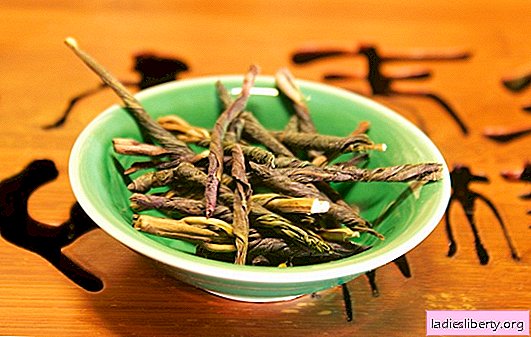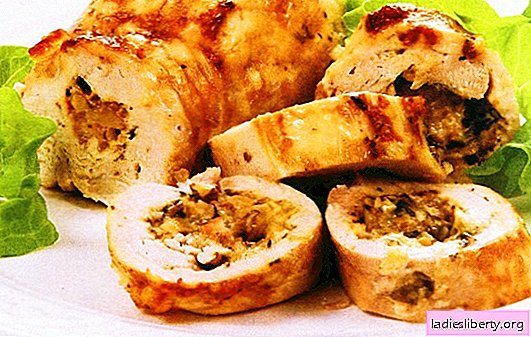
In the variety of herbal teas, kudin occupies a special place - an ancient pearl of oriental medicine, it is able to protect the body from many diseases. And in order for kudin to bring maximum benefits, it is important to know how to properly prepare and drink it.
How are the composition of kudin and its benefits interconnected
Elite herbal tea kudin is obtained from the leaves of holly broadleaf, which has two very remarkable relatives:
• wreaths from the branches of holly holly, with red berries-beads, in the USA and Europe it is customary to decorate houses and shopping centers for New Year's holidays, Christmas;
• Paraguayan holly leaves are used to make the famous mate tea.
As for the broad-leaved holly, this tall evergreen tree was known even in Ancient China, a drink from it was offered to the emperors as an elixir of longevity and court beauties as a means of preserving youth and radiant beauty.
A good kudin can only be obtained from leaves collected by hand and dried in the sun, which largely explains the rather high cost of this product.
The process of processing raw materials is most appropriate to compare with what they do with green tea.
For an unusual taste with a predominance of interesting bitterness, the drink was also called a “bitter tear”, but only the drink turns into no tears at all (and it is really tasty, you just need to get used to it), but a huge benefit for the human body.
Once upon a time, it was valued no less than ginseng and eleutherococcus, but today its multifaceted benefits are scientifically confirmed, based on a rich, wonderfully balanced chemical composition, the elements of which mutually balance and reinforce each other.
• So, it contains caffeine, a well-known tonic that drives apathy and drowsiness. Here are just organic acids and essential oils from the leaves of broadleaf holly that react with it so that kudin is not addictive - each time it is effective, as for the first time, and in addition, does not create an excessive load on the heart;
• the concentration of flavonoids in this holly is much higher than in many other plants and it is impossible to overestimate the importance of these substances as antioxidants, regulators of the production of enzymes and means of strengthening the immune system;
• kudin is indicated for seasonal vitamin deficiencies (A, E, D, U and B1) and a deficiency of mineral substances, in the content of which it is several times greater than traditional green tea. If, in parallel with kudin, one consumes that contains iodine (sea fish, for example), then its digestibility and effect on the thyroid gland will be really at an altitude.
When to Benefit from Kudin
Kudin is useful for the treatment and prevention of atherosclerosis, thrombophlebitis and stroke, as well as hypertension - due to its properties, thin the blood, remove "bad" cholesterol, dilate blood vessels and increase their strength with elasticity.
The anti-inflammatory and bactericidal properties of the plant are well known, so it can be used to treat a wide variety of diseases, including diseases of the genitourinary system, seasonal viral diseases (flu) and viral arthritis.
Kudin positively affects the endocrine system, preventing hormonal changes and related problems in the reproductive system of men and women.
Bitter tea prevents disturbances in the functioning of the gastrointestinal tract, especially those that can be caused by malnutrition and maintains a healthy microflora throughout the digestive tract.
Also, the positive effect of kudin on the human body is expressed in the following:
• normalization and even a decrease in appetite (when drinking a very strong drink), which makes kudin very useful for those who want to lose weight;
• accelerating the treatment of dermatological diseases (kudin increases sensitivity to the active components of drugs for them);
• quick recovery after poisoning - due to its properties, accelerate metabolism and remove toxins (kudin literally collects them throughout the body, freeing even the liver from old "poisons").
How to choose, brew and drink kudin with benefit and pleasure
Depending on the sheet processing technology, kudin is:
• twisted;
• spiral;
• sheet;
• related;
• pressed.
Each type of tea, of course, has its own taste.
It is also important whether the leaves were collected very young or already mature.
The former are faster, easier to convey to the drink a rich strength and are not so bitter, but the latter, although they give the tea and valuable substances more slowly, are suitable for repeated brewing and have a more expressive taste.
You can cook kudin in different recipes, but the easiest way is to brew, following a few simple rules:
• water should be hot, but within 80-90 ° С, otherwise the drink will be bitter no worse than wormwood;
• each teaspoon of tea leaves is supposed to pour 200-250 ml of water;
• before the process of brewing a drink, a glass or ceramic teapot is heated with boiling water;
• for the first time, less than half of the required volume is poured into the water, and even cold can be added - anyway, first you need to mix the tea leaves in it and drain the water, thus cleaning the cudine of dust and debris. In addition, this technique allows all facets of kudin's taste to reveal more fully;
• the second time the kudin is poured with the entire volume of hot water and, having covered with a lid, insist from 2 to 7 minutes.
As already mentioned, the kudin can be brewed again, up to 5 times, but only this should be done sequentially, time after time, and not withstand intervals of several hours (overcooked kudin is not only not tasty to drink, but also not good).
A good, correctly brewed tea has a yellowish-greenish, sometimes closer to green, shade and a delicate pleasant aroma.
It is supposed to drink tea without haste, in small sips, and then you will be able to fully enjoy the main notes of its bright taste and weightless sweet aftertaste.
You can control the level of bitterness by varying the proportions of the brewed water and the brewing time of the tea - the longer it is, the more kudin is bitter. In addition, to taste you can sweeten the drink with sugar or honey, soften its bitterness with milk.
In order to extract the maximum benefit from kudin, it is recommended to drink it 2-4 times a week, 1-2 cups a day.
Kudin is recommended not to drink on an empty stomach and not to supplement them with meals, this is not tea for cakes, but first of all - a medicine, the absorption of which should not interfere. Perhaps the exception can be made only for light fruit sweets - candied fruit, jam, marmalade, marshmallows.
But to use it 30-60 minutes after a hearty lunch or dinner is useful - it will contribute to the normal breakdown of fats.
Can there be harm from kudin
In order to avoid harm from kudin, its use is strictly limited (if not prohibited at all) for inflammatory diseases of the gastrointestinal tract, including chronic gastroenteritis, gastritis and peptic ulcer of the stomach and duodenum.
Kudin should be abandoned at the time of taking drugs that affect the hormonal background, since the mutual reaction of such agents and the chemical composition of the plant has not yet been fully studied.
Also, despite the fact that kudin has a beneficial effect on a relatively healthy endocrine system, with serious violations in its work, this drink, if you drink it often and in large quantities, is able to further destabilize and worsen the patient's condition.
If you drink it a little, then there should be no harm from kudin during pregnancy, but if you breastfeed it is excluded, firstly, since it can provoke an allergic reaction in a child, and secondly, because a specific bitterness of the drink can, theoretically, ruin the taste of milk that an infant can refuse.
In adults, allergy to kudin is extremely rare, but still, for those who are new to this tea, it is recommended that the first few tea parties fill their cups with them a quarter to a third and, for a clearer reaction of the body, do not supplement the kudin with either snacks or milk.











